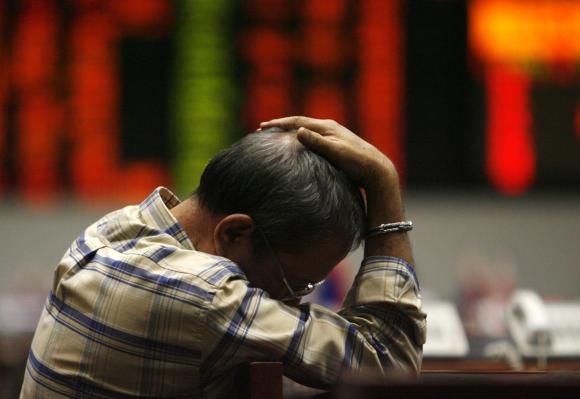
This columnist cannot pretend to be an economic expert but can certainly point out that the statistics being reeled out on a daily basis now, have added to the economic burden of the people, says Seema Mustafa.
Nineteen ninety one seems to be staring the Indian whiz kids in the face. Two decades down the line, the economic policies of recent governments have burst the dream bubble, with the rupee all set to touch a 80-to-a-dollar high, gold prices increasing even as one writes, and foreign exchange reserves disappearing by the hour.
Except for ‘all will be well’ murmurings from the government, there has been little else to assure the people that the decline will be reversed, and the promises of an India leaping ahead with amazing growth figures, will be kept.
The Left parties had been warning of this crisis ever since the governments of India plunged into reckless economic reforms, but the media joined industry and government to dub the objections as ‘outdated’.
In fact some newspapers took great delight in ointing to the fact that a particular Communist leader was friendly with industry, or another had his son studying abroad, to divert attention from the larger objection and the alternative economic policies offered by well known economists for sustained but perhaps comparatively low paced growth.
This columnist cannot pretend to be an economic expert but can certainly point out that the statistics being reeled out on a daily basis now, have added to the economic burden of the people. Distress suicides have been reported from some of the big cities even before this current collapse, with entire families taking their own lives because of economic hardship.
Suicides by farmers is well known, but even if the figures have declined somewhat, there is little to suggest that the poor and marginal farmers are being able to make their ends meet. Agrarian unrest is visible on the roads with peasants coming together to protest against the acquisition of their land by government or private or both parties, and staying on the roads for months and years as in Orissa to prevent their land from being acquired by the big companies.
The urban poor is adversely affected, with the gap between the rich who flourished under the new economic policies, and the poor becoming more visible and stark. The 1990 images of slums nestling along luxurious skyscrapers have never really gone away, except that in Delhi the slums have been made to disappear from the main city so that the poor remain out of sight.
Unlike their grandparents the poor urban youth are not resigned to their fate, but are openly hostile, angry and alienated with the gap constantly staring them in the face in the big cities. No one wants to admit it, but the increasing cases of gang rape in the metropolis can be directly linked to this increasing anger, with the slumlords joining the feudal overlords, or the conquering armies of the past, to target and attack women.
In Delhi and in Mumbai, the two incidents of gang rape that had women protesting on the streets for days on end, were clearly a manifestation of this alienation and subsequent violence, and of course the larger understanding that they would get away, because of the reprehensible law and order situation in the country. Recent figures show one lakh rape cases are still pending in the courts.
Prices are beyond the poor family’s reach with the additional burden on the poor unimaginable. Onions at Rs 80 make a mockery of the national food bill recently passed by the Congress government to make some grains available to the poor at a low price. Ironically this comes after almost ten years -- not including the National Democratic Alliance government’s term in office -- of dispensing with the excellent public distribution system that made the same and more available for those with ration cards. There were some problems but instead of dealing with these and restoring the PDS chain, the government decided to do away with the scheme altogether despite protests from the Left and some of the regional parties, leaving the poor without the means to sustain themselves despite rising prices. The middle class is reeling under the impact, the poor are silent and desperate, with now even the rich with their investments and their gold and their travels abroad seriously affected.
This was the story of South Asia but India claimed to have stepped out of the cesspool. It now seems that we are all back in the mess together.











 © 2025
© 2025